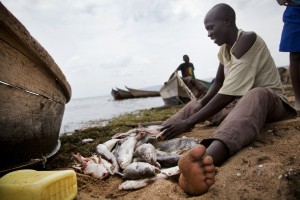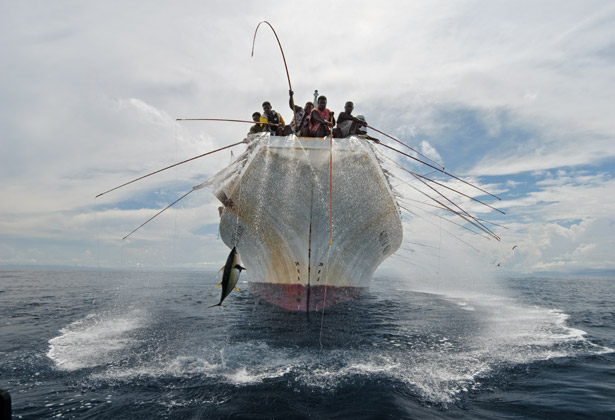Enclosures of water are being dispossessed from small-scale markets in a rising trend of so-called “ocean grabbing,” according to a recent report by Transnational Institute (TNI) and Afrika Kontakt. Claiming that seas and shores must be taken from common fisher people in order to preserve sustainability, the World Bank is backing corporate interests and a rise in large-scale aqua-industry market-based fishing policies.
“Ocean grabbing is occurring in varied ways,” stated TNI in their report. “One common denominator is the exclusion of small-scale fishers from access to fisheries and other natural resources and access to markets through the adoption or reinterpretation of laws, regulations or policies affecting fisheries governance.”
“Throughout the world, legal frameworks are emerging that undermine the position of small-scale fisheries producers and systems, while strengthening or reinforcing the position of corporate actors and other powerful players. Such ‘perfectly legal’ reallocation processes may or may not involve coercion and violence, but are far from being considered as socially legitimate. They typically involve three types of mechanisms.”
 Some key examples offered by the report were used to illustrate the variety of ways in which common access to fishing was being blocked. Luxury beach-resorts occupying long swathes of coastal land, destruction of mangrove areas for purposes of promoting export-oriented shrimp farms, and the rise of Rights Based Fishery (RBF) policies were some of the “technically legal” ways listed by which fisher people were dispossessed or their waters were destroyed in Sri Lanka, Ecuador, Europe, Canada and elsewhere.
Some key examples offered by the report were used to illustrate the variety of ways in which common access to fishing was being blocked. Luxury beach-resorts occupying long swathes of coastal land, destruction of mangrove areas for purposes of promoting export-oriented shrimp farms, and the rise of Rights Based Fishery (RBF) policies were some of the “technically legal” ways listed by which fisher people were dispossessed or their waters were destroyed in Sri Lanka, Ecuador, Europe, Canada and elsewhere.
The World Bank enabled “ocean grabbing” through legal frameworks such as its Global Partnership for Oceans (GPO), the report found. GPO enabled the spread of private property rights over the ocean’s fish resources, and was justified by the lack of economic and environmental “sustainability” in the world’s fisheries.
Growing populations around the world are placing stress on fish resources, according to the justification for GPO. For example, in South Africa, access to fish was curtailed for over 60,000 fisher people when a similar privatization program was passed.
The numbers of fisher people wanting access to water resources worldwide is in the billions.
“FAO estimates that 58 million people are engaged in the actual fishing and harvesting in wild-capture fisheries and aquaculture, and that more than 800 million people worldwide depend on fisheries in various ways,” stated TNI. “In addition to these figures, a large number of rural peasants and other people working in rural areas also depend on fishing as a supplement to their main livelihoods.”
By Sid Douglas
